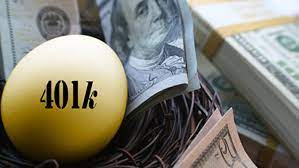Things to Consider to Take Money Out of A 401k Plan
Feb 28, 2024 By Susan Kelly
The plan is not to start withdrawing from the account until after retirement. If necessary, you can withdraw money from the account before you reach the age of 59 and a half. However, with a few notable exceptions, the account holder will be subject to a sizeable income tax bill in addition to a 10% penalty. In addition, they will have no retirement savings left after the early withdrawal of their funds. Before you take money out of your 401(k) too soon, there are a few other things you should look at first. If you are forced to make the withdrawal, there are strategies to lessen the impact it will have on your finances.
Understanding Early Withdrawal From a 401(k)
Because of the potential for severe financial consequences, the choice to take money out of your 401(k) plan before it is fully vested should not be taken lightly. It actually ought to be reserved for use as a fallback option. Because all employers do not permit early 401(k) withdrawals, the first thing you need to do is check with your company's human resources department to see whether or not you have the option to take money out of your account early. If you are under the age of 5912 when you make a withdrawal from your 401(k), you will be subject to an early withdrawal penalty of 10% beginning in 2021. You will also be responsible for paying the standard income taxes on the money you remove. After paying all the applicable taxes and fees associated with a withdrawal of $10,000, you will only get around $6,300 in cash.
The Hardship Withdrawal
For "immediate and substantial financial requirements," the Internal Revenue Service allows for penalty-free withdrawals from retirement accounts. Check the guidelines now in effect with the IRS to determine whether the circumstances surrounding your need to withdraw money might be considered a "hardship withdrawal." Keep in mind, though, that you will still be responsible for paying income taxes on that money. Your complete withdrawal will be subject to taxation if the IRA is of the classic kind. Because the contributions to the Roth IRA come from money you've already had taxed, the only taxes you'll have to pay are on the earnings generated by the account.
Exceptions to the Penalty
When used for specified purposes, the Internal Revenue Service (IRS) does not assess a penalty for withdrawals. Amongst other things, they include a down payment on a first house, eligible college fees, and medical payments. You will still be responsible for paying income taxes on that money, but you won't have to pay the penalty as you would with the hardship withdrawal.

The Exception Regarding COVID-19
Individuals whose lives were impacted by the coronavirus pandemic were permitted under the CARES Act to withdraw up to one hundred thousand dollars from their 401(k) accounts, assuming that their employers complied with the CARES Act's distribution guidelines.
How to Make an Early Withdrawal from a 401(k)
After determining whether or not you are qualified to make a withdrawal and selecting the kind of withdrawal you want, you will need to fill out the required paperwork and produce the appropriate documentation. Your employer and the cause for the withdrawal will determine the paperwork and documentation that need to be provided, but after all of the paperwork has been turned in, you will get a check for the cash you requested, and ideally, you won't have to pay the 10% early withdrawal penalty.
Borrowing From a 401(k)
Taking out an early withdrawal from your 401(k) is not as advantageous as taking out a loan against your account. You are, in effect, giving money to yourself on the condition that you will pay it back. If you take money out of your investment account, you will permanently lose that money. However, if you take out a loan, you will be able to replenish the money, and you will be able to do so by having payments taken out of your salary.
Substantially Equal Periodic Payments (SEPP)
Suppose the funds are held in an Individual Retirement Plan (IRA) rather than a company-sponsored 401(k) account. In that case, you have another option known as substantially equal monthly payments (SEPPs) for withdrawing them without having to pay the early distribution penalty. These payments are known as SEPPs.

Withdrawals from your SEPP are not the most excellent option to pursue if your financial necessity is just temporary. When you first begin receiving payments under the SEPP, you are required to do so for at least five years or until you reach the age of 59 and a half, whichever comes first. In such a case, the early payment penalty of 10% will still be applied, and you will also be responsible for paying interest on any deferred penalties from previous tax years.








